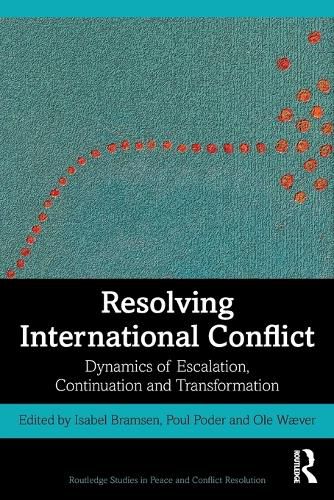Readings Newsletter
Become a Readings Member to make your shopping experience even easier.
Sign in or sign up for free!
You’re not far away from qualifying for FREE standard shipping within Australia
You’ve qualified for FREE standard shipping within Australia
The cart is loading…






Resolving International Conflict rethinks the dynamics of conflict escalation and continuation by engaging with research from the wide range of subfields in this area.
The book suggests a new framework for understanding conflict as a particular form of situation, interaction and tension. It shows how conflicts are shaped by varied dynamics relating to emotion, securitization, incentives, digital technology and violence; even attempts at monitoring, resolving or remembering conflicts may end up contributing to their escalation or continuation. Split into two sections, the first part focuses on the question of why and how conflicts escalate, while the second part analyses the continuation of conflict. The book features several case studies of conflict escalation and continuation - in Bahrain, Israel-Palestine, South Sudan, Northern Ireland and, most prominently, the case of the Syrian uprising and subsequent civil war. Throughout the book, and, in particular, in the conclusion, the consequences for conflict transformation are discussed.
This work will be of much interest to students of conflict resolution, peace studies, war and conflict studies, security studies and international relations, in general.
$9.00 standard shipping within Australia
FREE standard shipping within Australia for orders over $100.00
Express & International shipping calculated at checkout
Resolving International Conflict rethinks the dynamics of conflict escalation and continuation by engaging with research from the wide range of subfields in this area.
The book suggests a new framework for understanding conflict as a particular form of situation, interaction and tension. It shows how conflicts are shaped by varied dynamics relating to emotion, securitization, incentives, digital technology and violence; even attempts at monitoring, resolving or remembering conflicts may end up contributing to their escalation or continuation. Split into two sections, the first part focuses on the question of why and how conflicts escalate, while the second part analyses the continuation of conflict. The book features several case studies of conflict escalation and continuation - in Bahrain, Israel-Palestine, South Sudan, Northern Ireland and, most prominently, the case of the Syrian uprising and subsequent civil war. Throughout the book, and, in particular, in the conclusion, the consequences for conflict transformation are discussed.
This work will be of much interest to students of conflict resolution, peace studies, war and conflict studies, security studies and international relations, in general.